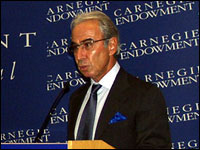Registration
You will receive an email confirming your registration.
IMGXYZ523IMGZYX
“Iran’s Nuclear Ambitions” is important for its contextualization of the Iranian crisis in the broader international setting without diluting the importance of domestic divisions and regional influences that both support and constrain the Iranian government’s actions. In his speech, Chubin provided critical insights into the differing opinions of elites in Iran, allowing for more informed analysis of the government that may be useful in constructing policies toward Iran.
The Iranian Position: Official Policy and Elite Perspectives Diverge
Official Policy
- Nuclear energy is a national project.
- Iran is independent, self reliant, and a model of political Islam for the rest of the globe. It does not take orders, and places a high value on “pride” and “honor.”
- Iran seeks to push US out of the region- US seeks to dominate governments and resources
- To this end, the US wishes to prevent development and deprive growing states of their ability to flourish.
- To counter the US intent to dominate, Iran should incite other Islamic revolutions in the region to prevent secular governing to succumb to the will of the west.
However there are two main divisions in the government:
Realists: Nuclear energy provides a means of negotiating with the west and extracting significant concessions for the economy. Giving up a nuclear weapons potential allows for Iran to become an internationally accepted, more powerful regional influence, and a more legitimate state.
(Mostly middle class, educated, urban Iranians.)
Conservatives: Nuclear power is a way to pursue the Islamic revolution on equal terms with the West. Nuclear weapons - or break-out capacity – offer status, signify technological superiority, and strengthen Iranian diplomacy.
(Mostly revolutionary guard, under-educated, rural Iranians.)
The conservatives are currently in power, and continue to gain support due to the US presence in the region that inflames Muslims, the poor performance of the US against Islamic militants, and the boost to Iranian power that occurred after the self-proclaimed Hizbollah “victory” over Israel in the recent conflict. Confrontational approaches tend to push the Iranian government together, and closer to the conservative way of thinking. Examples of the benefits of cooperation may give the realists more ammunition against the conservative thinkers.
The Iranian Nuclear Program
The program is long standing with incremental parts, with a high level of indigenous development. Security has been a motivation in Iran-Iraq war and today due to US threat, although program began earlier and continues without open hostilities against Iran. The most important influence is probably domestic support and the sense of national pride associated with nuclear enrichment (whether it is for weapons or not is debatable).
Iran continues legalistic arguments for its program in an effort to obtain international legitimacy. By appealing to Article IV of the NPT, Iran has framed the issue as being about a denial of its rights rather than a breach of its obligations (to clarify inconsistencies in the IAEA reports). Iran’s erratic behavior, and inconsistent cooperation with the IAEA make its motives suspect, but most likely Iran does not want a full weapons program now. The Article IV requirement for the support of indigenous energy development in non-nuclear nations may provide Iran with the ability to have point-of-no-return break-out capacity, allowing it to obtain the technology necessary to weaponize in a matter of months or years.
Policy Implications
1. Don’t make threats you can’t follow through on. Since confrontational policy drives the regime together, threats simply push the population and the elites onto the side against the US.
2. Keep the threat of violence on the table (or at least under it). While provocative threats bring the country together, an underlying understanding that physical aggression will be incurred without negotiation is the only way to encourage any concessions from the Iranians.
3. Offer moderates fodder for their cooperative position. By presenting examples of possible benefits to a less antagonistic policy, a real debate in Iran may be sparked. Encouraging an intellectual debate on these issues may lead to a more internationally beneficial outcome.
4. Publicize terms of offers. Do not allow the Iranians to continue framing the debate in their own view. Be open about carrots being offered to further spark debate in Iran.
5. Bilateral financial sanctions are not the answer. International sanctions may have more impact, but maintaining or expanding the current sanctions have not been beneficial to US interests.
